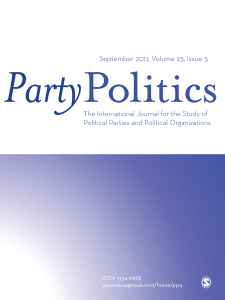Government and Opposition (by Marina Costa Lobo, Instituto de Ciéncias Sociais, Lisbon)
 In January 2017 Donald Trump was inaugurated as the forty-fifth president of the United States. Trump’s ability to win the Republican Party nomination, against the will of the party grandees, went against the received political science wisdom, which placed party elites in charge of the choice of presidential candidates in the US (Cohen et al. 2009). His subsequent victory against Democratic candidate Hillary Clinton further challenged the idea that the two parties controlled
In January 2017 Donald Trump was inaugurated as the forty-fifth president of the United States. Trump’s ability to win the Republican Party nomination, against the will of the party grandees, went against the received political science wisdom, which placed party elites in charge of the choice of presidential candidates in the US (Cohen et al. 2009). His subsequent victory against Democratic candidate Hillary Clinton further challenged the idea that the two parties controlled
access to American institutions. Trumpism is a clear sign of the decline of political parties as institutional gatekeepers and is symptomatic of the rise of the media-driven, outsider leader. Yet is this a specifically
American phenomenon, or has it spread to other countries?
In Italy, the rise of Silvio Berlusconi as leader of Forza Italia and the longest-serving prime minister of Italy is perhaps the closest parallel to Trump. Berlusconi was also an outsider – a media and construction billionaire – who stormed Italian politics. He was elected as MP in 1994 and went on to serve on three different occasions as
prime minister of Italy (1994–5, 2001–6 and 2009–11). Berlusconi, unlike Trump, created his own party, at a time when the party system in Italy was imploding (Bartolini et al. 2004) under the weight of tangentopoli. Despite being dogged by the judiciary for most of his mandates, he dominated politics in Italy for more than a decade.
Another Italian politician, Beppe Grillo, the leader of the Movimento 5 Stelle (5 Star Movement – M5S) is also a clear example of a mediatized personality, in this case using the internet to gain visibility. His party has been described as belonging to a personal party model (Diamanti 2014). He illustrates the importance that new
media may have in the process of the personalization of politics which has been recurrent in Italy. Founded in 2009, M5S won 25 per cent of the vote in the 2013 legislative elections and 109 seats in the Italian parliament, becoming the second largest party in Italy. The election of Marcelo Rebelo de Sousa as president of Portugal
can also be counted as one of the more recent cases of the extreme mediatization of politics. Despite not being the head of government, the president of Portugal holds important prerogatives both in terms of veto power and in relation to the dissolution of the Assembly, which can be crucial when governments are weak (Amorim Neto and
Lobo 2009). Although Rebelo de Sousa has been a centre-right party member for most of his active life, and was even leader of the Partido Social Democrata (PSD) between 1996 and 1999, Marcelo – as he is known to the Portuguese – became a household name from 2000 because of his weekly political commentary shown on open access television networks. Marcelo is, to a large extent, a product of the media, where he carefully crafted an image of a likable politician over the course of 15 years. In 2015 he decided to run for the presidency against the wishes of the PSD leader, Pedro Passos Coelho, who saw him as an outsider. He persevered nonetheless, running a campaign with little funding and winning the presidential election on the first round in January 2016 with 52 per cent of the vote. HERE THE FULL ARTICLE (pdf)
 Only a few scholars would question the thesis concerning the recent increasing importance of the key members of the executive in democracies, a phenomenon related to the centralization of both executive power and the organization of political parties. Many scholars would, however, oppose or dispute the concept of the ‘presidentialization’ of politics that has been developed since the early 1990s to capture such a development. The recent volume edited by Gianluca Passarelli sheds new light on the concept and its analytical potential to unravel the processes of transformation of the organizational patterns of contemporary political parties. The volume covers the conceptual debate as well as 11 country studies. The opening chapter, written by the editor, offers an interesting conceptual introduction which not only provides the framework for the country studies but, above all, increases the analytical potential of the very concept of party presidentialization. Here the full article in PDF
Only a few scholars would question the thesis concerning the recent increasing importance of the key members of the executive in democracies, a phenomenon related to the centralization of both executive power and the organization of political parties. Many scholars would, however, oppose or dispute the concept of the ‘presidentialization’ of politics that has been developed since the early 1990s to capture such a development. The recent volume edited by Gianluca Passarelli sheds new light on the concept and its analytical potential to unravel the processes of transformation of the organizational patterns of contemporary political parties. The volume covers the conceptual debate as well as 11 country studies. The opening chapter, written by the editor, offers an interesting conceptual introduction which not only provides the framework for the country studies but, above all, increases the analytical potential of the very concept of party presidentialization. Here the full article in PDF



